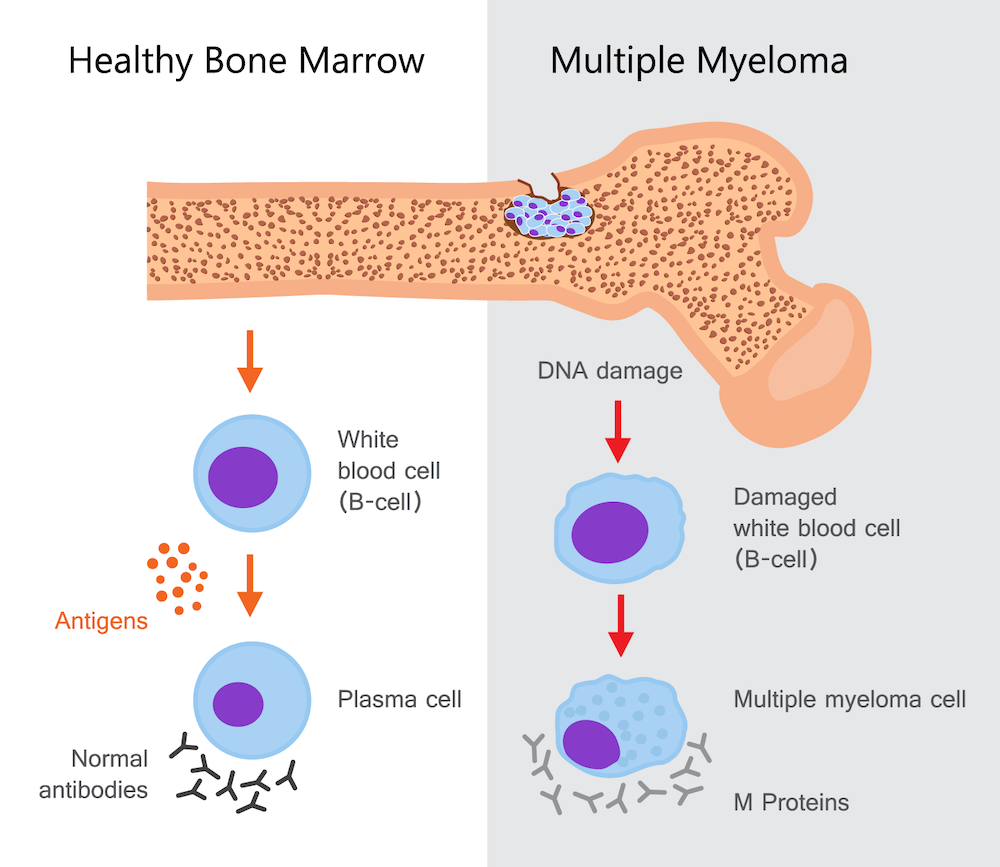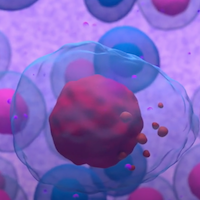Multiple myeloma is a type of cancer that begins in plasma cells (white blood cells that produce antibodies). Also called Kahler disease, myelomatosis, and plasma cell myeloma.
 Multiple myeloma cells are abnormal plasma cells (a type of white blood cell) that build up in the bone marrow and form tumors in many bones of the body. Normal plasma cells make antibodies to help the body fight infection and disease. As the number of multiple myeloma cells increases, more antibodies are made. This can cause the blood to thicken and keep the bone marrow from making enough healthy blood cells. Multiple myeloma cells also damage and weaken the bone.
Multiple myeloma cells are abnormal plasma cells (a type of white blood cell) that build up in the bone marrow and form tumors in many bones of the body. Normal plasma cells make antibodies to help the body fight infection and disease. As the number of multiple myeloma cells increases, more antibodies are made. This can cause the blood to thicken and keep the bone marrow from making enough healthy blood cells. Multiple myeloma cells also damage and weaken the bone.
Symptoms and Diagnosis
Multiple myeloma is often not diagnosed unless specific tests, like the simple blood test serum protein electrophoresis (SPEP) are performed. Although some patients have minimal or no symptoms, other patients with more advanced disease can have symptoms related to the presence of the high number of plasma cells making only one antibody. These include:
- Bone and back pain secondary to weakening of the bones
- Anemia
- Kidney injury
- Increased number and severity of infections due to the loss of antibody diversity
Treatment
There are different types of treatment for patients with multiple myeloma including chemotherapy, targeted therapy, high-dose chemotherapy with stem cell transplant, immunotherapy, radiation therapy, surgery, and watchful waiting. New types of treatment for multiple myeloma also are being explored in clinical trials. At Rutgers Cancer Institute, our multidisciplinary team collaborates with experts across various programs within our center and throughout RWJBarnabas Health – providing our patients with a treatment plan tailored just for them. Our program is led by international experts in the field.
Portions of the above were originally published by the National Cancer Institute.
To request an appointment, call 844-CANCERNJ. | Find Multiple Myeloma Clinical Trials.
Useful Links
What is Multiple Myeloma?
Dr. Mansi Shah of Rutgers Cancer Institute, discusses multiple myeloma causes, treatment and research at NJ's ONLY NCI-designated Comprehensive Cancer Center.

Living Life to the Fullest
Active in her daily life, Adrienne Graubard wasn’t going to let multiple myeloma keep her down. Collaborative care at Rutgers Cancer Institute and Robert Wood Johnson University Hospital Somerset and a stem cell transplant has her in remission and feeling great. Read more






